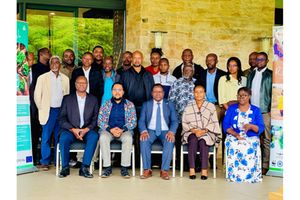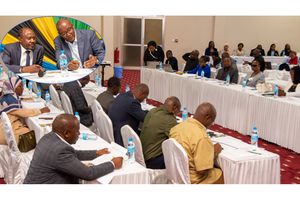Put in place effective communication to end wrangling, says Samia

President Samia Suluhu Hassan addresses a meeting of senior government officials at the Arusha International Conference Centre (AICC) yesterday. PHOTO | STATE HOUSE
What you need to know:
- She said infighting among top officials was partly to blame for what appears to be a missing link in the state’s internal communication system.
Arusha. President Samia Suluhu Hassan yesterday called for effective communication within the government to avoid wrangles.
She said infighting among top officials was partly to blame for what appears to be a missing link in the state’s internal communication system.
“Communication within and outside the government has not been at its best. We are too slow,” she stated.
President Hassan said when she was opening a retreat for the top leaders that lack of effective communication impacts on service delivery.
At times, this has led to different leaders or departments issuing conflicting information or data on the projects.
The Head of State regretted that in the end the drawback has led to what she is averse to; infights and misunderstandings among the top officials.
She added that conflicting information has also impacted on the country’s trade and investment performance. She said whenever Tanzanian officials travelled abroad, they talked nicely about the country’s potential for foreign direct investments.
“However, once they (foreign investors) land here they are faced with a number of hurdles and frustrations,” President Hassan explained.
One of the items on the agenda at the retreat, she further said, was how the government will work closely with the private sector.
“The goal is to make the country attract more investments and trading partners. The government has to be facilitative to investors,” she noted.
The retreat, at the Arusha International Conference Centre (AICC), is targeting the ministers, deputy ministers and the permanent and their deputies.
During the three-day event, those in attendance will be reminded of the boundaries of their mandates and how to deliver effectively.
She expressed her concerns that some leaders, including ministers, were not conversant with the boundaries of their responsibilities.
“You are here to get fresh guidelines on how to operate within the confines of your assigned duties,” she explained.
For the newly appointed officials, this would be an opportunity to grasp the supervision skills of government operations.
President Hassan said although the retreat is not targeting only her recent appointees, it has come at a time when the government needs leaders who can deliver.
The leaders need to be reminded of their duties “and for the minister to know exactly what the nation expects from his or her ministry.”
The retreat is taking place only days after a mini-cabinet reshuffle in which he fired a minister and shuffled the positions of several deputy ministers.
The President also appointed scores of permanent secretaries and deputy permanent secretaries and transferred others to the new dockets. During the swearing in of the new officials on Monday, President Hassan openly expressed her dismay over feuding public officials, threatening to fire them.
Several presentations were made at the retreat by governance experts from, among others, the Uongozi Institute, a think tank under the Office of the President.
The institute seeks to promote the recognition of leadership in sustainable development in Tanzania and the wider continent.
Chief Secretary Moses Moses Kusiluka mentioned five topics which will feature in the retreat, among them human resources management.
Others are operating procedures, relations and operational boundaries in the government and policy decisions procedures in the government.
Also to be discussed are the relationship between the government and private sector and various guidelines for working in the government.
The last time a similar retreat took place was in February 2006, only two months after the coming in power by the fourth phase government of President Jakaya Kikwete.
The weeklong exercise took place at the Ngurdoto Mountain Lodge outside Arusha city and initially targeted the ministers and their deputies and PSs and their deputies.
Later in that year, a similar retreat was organized for the district commissioners and the district/municipal/city directors at the same venue.
Meanwhile, various experts and policy analysts have supported the government’s decision to re-introduce a retreat for the freshly appointed and other leaders.
Dr Lazaro Swai, a human resources lecturer at Tumaini University Dar es Salaam College (TURDARCo), said absence of such exercise may have compromised the performance of the civil service.
He added that it was unfortunate there had been misunderstandings between the ministers and their deputies. He attributed the scenario to lack of understanding of the boundaries of duties.
However, he suggested that the powers of the minister and the permanent secretary should be made clear because both of them are key leaders at the ministry.
Dr Raphael Mbunda, a political science lecturers at the University of Dar es Salaam (UDSM) said the performance of each ministry should be measured each six months or year under a special contract with the appointing authority.
Mr Joseph Butiku, the executive chairman of Mwalimu Nyerere Foundation (MNF), said such misunderstandings between leaders at ministerial and other levels existed even in the early independence days.
“Mwalimu (the Nation Founder Julius Nyerere) did his best to sort out this by bringing all the groups in the government in a round table….He would brief them on the way forward for his administration regardless of the differences amongst different officials or groups. Through dialogue we moved forward,” he said.




